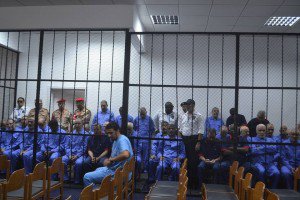By Libya Herald staff

Tunis, 28 April 2015:
The chief prosecutor of the International Criminal Court says she is happy with the trial . . .[restrict]of Libya’s former intelligence chief Abdullah Senussi in Tripoli – despite admitting she has no information on how it is being conducted.
UN trial monitors fled the city last summer at the start of Libya’s civil war, and since then the ICC has had little idea what is taking place.
However, the chief prosecutor, Fatou Bensouda, has told Senussi’s ICC-appointed lawyers in London there is no reason to review The Hague’s original decision to let Libya hold the trial.
“Neither the deteriorating security situation in Libya, nor the apparent change in power in Tripoli, have had a detrimental impact on the trial process,” her office said in a statement,
Two years ago, the ICC gave Libya permission to try Senussi, which was conditional on him having a fair trial.
The case has been one of the most controversial in the ICC’s short history.
In 2011 the UN Security Council ordered the ICC to investigate war crimes in Libya, and by June it had indicted Muammar Qaddafi, his son Saif Al-Islam and Senussi for war crimes and crimes against humanity.
Senussi, Qaddafi’s chief enforcer and blamed by many Libyans for decades of repression, was arrested in 2012 in Mauritania and extradited to Libya.
Saif was captured by Zintan militia, who refused to hand him over to Tripoli authorities.
Later in 2012, Melinda Taylor, Saif’s ICC appointed lawyer, was held by the Zintan militia for several weeks when she tried to visit him in the mountain town.
In 2013, ICC judges ruled that because Saif was being held by a militia, Libya could not guarantee a fair trial. But it agreed that Libya could hold the trial of Senussi, handing jurisdiction from The Hague to Tripoli.
Senussi’s trial began in April last year in Tripoli amid much confusion.
Libya refused to allow access to the public or broadcast proceedings, and a monitor from Human Rights Watch was denied entry.
Senussi with 22 other former regime officials, but plans for Saif to be included in the case, with proceedings broadcast to Zintan by video link, failed when the militia refused to produce him for the camera.
Two months later there was further controversy when the militia controlling Al-Hadba prison where the trial is held arrested a UN trial monitor for sorcery and black magic, later dropping the charges.
Despite the political crisis since July when Libya Dawn militias captured Tripoli and the internationally-recognised government fled to Tobruk, the case has continued in Al Hadba, with single-day hearings held about once a month under militia supervision. The most recent was on 14 April.
Amnesty International has reported judges saying they are intimidated by militias and many defence lawyers have fled – only to be fined LD 50 for failing to show up in court. Some journalists and relatives of the accused are allowed into the hearings but not the public, and proceedings are not broadcast.
Exactly what is taking place in the trial is unclear, with no easily accessible public record.
Bensouda reported her concerns about all this to the UN Security Council last November, saying: “The security situation in Libya is worsening; political instability is growing, and unfortunately, an environment is developing that clearly cannot be conducive to closing the impunity gap in Libya,” she said. “The on-going violence and alleged threats to judges, prosecutors and lawyers do not augur well for a fair trial that respects all the rights of an accused person.”
Afterwards, the UN wrote to her saying they had no means of knowing what is taking place, beyond occasional snatches gleaned from TV broadcasts.
Despite this, Bensouda has now decided that the trial is fine, “There must be new facts which “fully” convince the Prosecutor that the basis on which the Al-Senussi case was declared inadmissible has been negated,” her office said in a statement.
In other words, because she has no accurate information on the trial, she has no reason to think it is unfair.
Senussi’s ICC lawyers, Ben Emerson and Rod Dixon, say the ICC is failing in its duty to make sure any case handed to a state by the Hague is handled fairly.
“The ICC risks being accused of inconsistency,” Dixon told International Justice Tribune, a specialist judicial news service. “If the government no longer has control of a defendant, it cannot offer him a trial.”
There are reports from Tripoli that Senussi’s trial is moving towards a conclusion, but a charge sheet and details of the case have yet to be made public. The next hearing is due in May.
Senussi and his fellow indictees will find little sympathy from most Libyans, who remember the oppression of the Gaddafi years. Equally, many who fought in the revolution did so because they wanted the country to have the rule of law, where justice must not only be done, but also seen to be done.
For the ICC, the case sets an unhappy precedent, in which judges, having determined that a state can hold a fair trial, consider they have no responsibility to ensure fair trial promises are kept.







